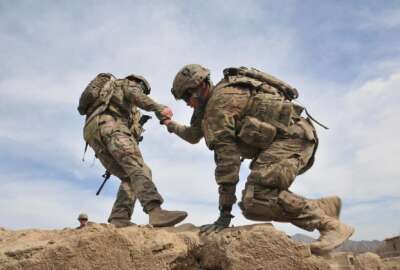
Military suicides rose in 2020, especially in reserve forces
The number of suicides in the military went up during an unusually stressful year.
The military saw an increase in the number of people in reserve components dying by suicide in 2020, and saw active duty suicides increase for the fourth year in a row.
According to the Defense Department’s quarterly suicide report, 194 reservists took their lives in 2020. That’s an increase of about 40 from 2019. The numbers were evenly spread throughout the year, with about 45 suicides each quarter, with an uptick to 57 in the last three months of the year.
A total of 377 active duty service members died by suicide in 2020. That number is up from 348 last year. Active duty suicides have been steadily increasing since 2016 when there were 280. In 2015, the military saw a slight dip to 266 from 276 in 2014.
National Guard suicides also increased in 2020 from 90 to 118.
Military leaders think COVID is playing a factor in military suicides.
“COVID adds stress,” said Gen. C.Q. Brown, the Air Force chief, last year. “From a suicide perspective, we are on a path to be as bad as last year. And that’s not just an Air Force problem, this is a national problem because COVID adds some additional stressors – a fear of the unknown for certain folks.”
DoD is still not finished with its statistical calculations for 2020. While the number of suicides is up, the rate has yet to be calculated.
At this time, it is too early to determine whether the suicide rates changed in 2020,” Army Maj. César Santiago, a Pentagon spokesperson, told Federal News Network. “Overall, suicide counts can vary year to year, but those fluctuations do not always mean the suicide rate for a given year will follow accordingly. Suicide rates (as opposed to counts released with the recent Quarterly Suicide Report) determine whether a true increase or decrease in suicides occurred across a given population, after accounting for changes in the population size in order to understand any changes, and provide a more standardized way to make comparisons over time or across groups.”
Santiago said that beyond individual approaches, DoD has broad efforts that target populations of greatest concern for suicide. DoD is also developing initiatives to support military families.
“For example, current efforts include interactive educational pilot programs to teach foundational skills to effectively deal with life stressors and to address help-seeking concerns and encourage use of support resources,” he said.
The Air Force in particular has been focusing on suicide prevent efforts after 137 airmen killed themselves in 2019. The service’s number were down to 109 in 2020.
“The Department of the Air Force has been and continues to pursue immediate, mid-term, and long-range suicide prevention initiatives for the total force that focus on connections between individuals, units, and Air Force family; protections in environments, services, and policies; detection of risk in individuals and units; and equipping the total force and family members to mitigate risk and increase resilience,” Lt. Gen. Brian Kelly, deputy chief of staff for manpower, personnel and services, said in a statement last year. “Suicide is a difficult national problem without easily identifiable solutions that has the full attention of leadership.”
The Air Force called for an all wings stand down in the middle of 2019 to address the issue.
The Army is also looking for novel ways to promote suicide prevention. The XVIII Airborne Corps is currently looking for soldier-generated ideas to stop suicides across the force.
Soldiers will submit their ideas to the Dragon Liar contest, which mimics the popular show Shark Tank.
“For us, this is about using our most-recognized program to save our teammates,” said Col. Joe Buccino, XVIII Airborne Corps innovation officer. “This is about using the Dragon’s Liar platform to raise awareness and give our soldiers a voice.”
Submissions are due May 1.
Suicide prevention resources for military and civilians
The Veterans Crisis Line and Military Crisis Line can be reached at 1-800-273-8255, press 1
The Veterans Crisis Line and Military Crisis Line connect veterans and service members in crisis and their families and friends with qualified, caring Department of Veterans Affairs responders through a confidential toll-free hotline, online chat, or text.
The National Suicide Prevention Lifeline can be reached at 1-800-273-8255. This is a hotline for individuals in crisis or for those looking to help someone else to speak with a certified listener.
The Crisis Text Line is a texting service for emotional crisis support. To speak with a trained listener, text HELLO to 741741. It is free, available 24/7, and confidential.
Copyright © 2024 Federal News Network. All rights reserved. This website is not intended for users located within the European Economic Area.
Scott Maucione is a defense reporter for Federal News Network and reports on human capital, workforce and the Defense Department at-large.
Follow @smaucioneWFED
Related Stories






